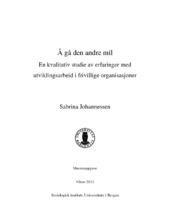Å gå den andre mil. En kvalitativ studie av erfaringer med utviklingsarbeid i frivillige organisasjoner
Master thesis
Permanent lenke
https://hdl.handle.net/1956/5891Utgivelsesdato
2012-06-19Metadata
Vis full innførselSamlinger
- Department of Sociology [437]
Sammendrag
Denne studien utforsker hvilke erfaringer frivillige og ansatte har med sitt arbeid i frivillige organisasjoner, og mer hvordan deres relasjoner i utviklingsarbeidet kan forstås. Studien viser at de frivillige og ansatte i Norsk Folkehjelp og Det Norske Misjonsselskap (NMS) har et komplekst bilde av sine egne, og frivillige organisasjoners rolle i det sivile samfunn, og ikke minst av målene og innholdet i utviklingsarbeidet.Studien argumenterer for at frivillige organisasjoners rolle i utviklingsarbeidet bør forankres i de ansatte og frivilliges egne erfaringer med arbeidet gjør. Studien tar for seg følgende problemstilling: Hvilke erfaringer har ansatte og frivillige i Norsk Folkehjelp og Det Norske Misjonsselskap med deres arbeid i de to organisasjonene? Og, hva kjennetegner relasjonene som oppstår i arbeidet med "de langt borte"?For å kunne si noe om dette er gjennomført ni kvalitative intervjuer med ansatte og frivillige i Norsk Folkehjelp og NMS, i tillegg til dokumentanalyse. Indivdenes erfaringer studeres i lys av organisasjonene de er med i, deres visjoner og mål. Ved hjelp av en rekke organisasjonsdokumenter er det dannet et bilde av Norsk Folkehjelp og NMS, deres historie, og mål i forhold til det internasjonale arbeidet de gjør. Disse to organisasjonene virker innenfor den samme institusjonelle konteksten, og det er derfor identifisert en rekke sentrale offentlige dokumenter ved hjelp av forskningslitteratur og aktuelle bistandsdebatter, som sier noe om de politiske føringene på dette feltet.En av funnene i denne studien er hvordan både ansatte og frivillige i de to organisasjonene kan beskrives som ildsjeler. De ansatte og frivillige er en del av en viktig frivillighetskultur. Det ligger en egenverdi i frivillighet som fremheves i begge organisasjonene, og det er særlig interessant at de ansatte fremhever viktigheten av de ulønnede arbeidet. Men, på samme måte som de frivillige, kan de ansatte også vurderes som ildsjeler. De ofrer økonomisk, er fleksible i sitt arbeid og tilpasser sitt privatliv for sine frivillige organisasjoner. Både ansatte og frivillige ser ut til å gå "den andre mil" for sin frivillige organisasjon.Ved hjelp av sensitiverende begreper blir det så klart hvordan informantene i denne studien ser ut til å oppfatte målene, og innholdet, i utviklingsarbeidet, og hvordan de ser ut til å oppleve relasjonen med "de langt borte". De ansatte og frivillige tar opp i seg statlig og organisatoriske føringer om partnerskap og menneskerettigheter, men det blir også klart at relasjonene i noenvgrad må vurderes som en gaverelasjon. Informantene beveger seg mellom ulike forståelser samtidig, og veksler også mellom dem. Dette illustrerer at de frivillige og ansatte har et svært komplekst bilde av målene og innholdet i utviklingshjelp. Samtidig gjør de også noen grensedragninger hva som bør, og hva som ikke bør, være en del av innholdet og målene i utviklingsarbeidet. Slike distinksjoner, som mellom nødhjelp og langsiktig utviklingsarbeid, viser deres kritiske potensiale i det sivile samfunn. This study explores the experiences of volunteers and employees and their work in non-governmental organizations (NGOs), and also how their relations with distant others can be understood. The thesis argues that the volunteers and employees in Norwegian People's Aid (NPA) and the Norwegian Mission Society (NMS) have a complex image of their own, and their organizations' role in civil society, and the goals and content of development aid.The study argues that NGOs roles in the development field should be anchored in the volunteers and employees' own experienced with the work that they do. The thesis therefore asks: What are the experiences of volunteers and employees in Norwegian People's Aid and the Norwegian Mission Society with the work that they do, and what characterizes the relations they have with distant others?To say something about this, nine qualitative interviews have been conducted with volunteers and employees in NPA and NMS, along with an analysis of documents. The experiences of the individuals are explored in light of the organizations they are part of, their visions and goals. By looking into organizational documents, one can better understand NPA and NMS' visions and goals in the international work they participate in. The two organizations both take part in the institutional context of international aid, and therefore, with the help of scientific literature and contemporary debates, central political guidelines for development aid have been identified.One of the findings in this study is how both employees and volunteers in NPA and NMS can be describes as committed. The employees and volunteers are both part of an important culture in the NGOs. There is a specific value in volunteerism which is highlighted in both organizations, and it is particularly interesting that the employees emphasize the importance of unpaid work. But in the same way as the volunteers, the employees can described as committed. They make economical sacrifices, are flexible in their work and adjust their personal lives for their organizations. Both employees and volunteers seem to go the other mile for their NGO.Using sensitizing concepts, it is clear how the individuals in this study , it becomes clear how they understand the goals and content of development aid, and also how they experience relations with distant others. The employees and volunteers adapt official and organizational guidelines of partnership and justice. But it is also clear that these relations also have to be considered as gift relations. The individuals move between different comprehensions at the same time. Thisiiiillustrates how the volunteers and employees have a very complex image of the goals and content of development aid. They also make important distinctions of what should and should not be a part of development aid. These distinctions, for example between long-term development aid and emergency relief work, illustrate their critical potential in civil society.
